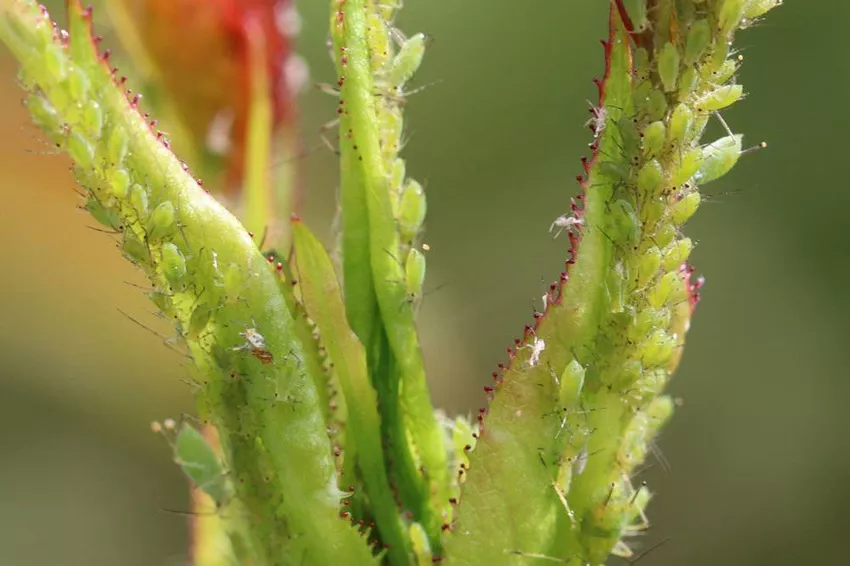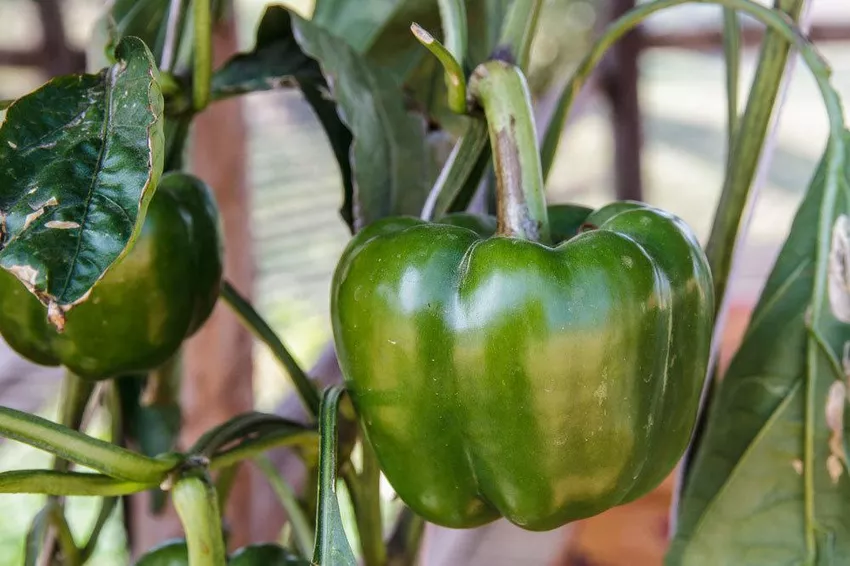
Peppers take time to reach the optimum point of ripeness. It's annoying when a lice infestation in particular causes growth to be inhibited or the pepper plants die. To prevent this from happening, you should find out in good time how to combat lice on peppers.
paprika
Sweet peppers, chili and hot peppers are among the most popular types of vegetables for domestic cultivation. They don't require a lot of attention and care. However, this plant genus tastes not only humans, but also lice. Once the first have gathered, it doesn't take long before the Capsicum (botanical name) begins to suffer damage. The key here is to act quickly.
lice
Garden season for lice
When temperatures rise in early spring, aphids and their conspecifics emerge from their warm winter quarters or emerge from hibernation. Then they get hungry and go in search of food. By the end of May at the latest, they can be found in almost every garden. If the hobby gardener is well prepared, they usually move from neighboring gardens to neighboring gardens. They attack countless plants - they find juicy food especially in the vegetable patch.
 aphid infestation
aphid infestation
They can be expected on pepper plants from early summer. The young plant tissue of the leaves is a delicacy for lice. From here they attack other plants and vegetables in the area. If they are not stopped, they can destroy entire crops and also attract mushrooms.
louse infestation
Reasons for the lice infestation damage
In addition to feeding, there are other reasons why sternorrhyncha (plant lice) are moving more and more into gardens and greenhouses. First and foremost, it is the usually exaggerated cleanliness/hygiene that is brought about by hobby gardeners, as well as artificial fertilization. This changes the natural soil climate and plants become more susceptible to severe damage from plant pests. Deficiency symptoms also contribute to the susceptibility to diseases caused by pest infestation.
Aphids & Co. particularly like the juice from young plants, which is why all types of peppers are particularly at risk during the rearing phase, especially after pricking out. Poor cultivation conditions weaken their resistance and for this reason, in the worst case, they can die off due to aphid infestation, while adult pepper plants can cope well with an infestation.
detect plant lice
In order to be able to react correctly in the event of a pest infestation on your peppers, it is necessary for you to identify them. As a rule, these are tiny animals a few millimeters in size, which you can see as dots with the naked eye. Depending on the species, they differ in color. Other identifiers are of equal or similar strength.
 pepper plant
pepper plant
louse characteristics
- Size: between four and seven millimeters
- Color: Aphids greenish or white, other plant aphids brownish to black
- mostly wingless - new generations are few exceptions
- proboscis
- usually sit on the undersides of the leaves and on the stems
- after a few days of the initial infestation, entire colonies quickly form
plant symptoms
- white specks on the upper side of the leaf (puncture holes of the lice)
- sticky coating on the leaves (honeydew)
- initially yellowish-brown discoloration of the affected leaves
- black leaf coloring in the advanced stage
- unusually high leaf drainage
- Leaves wither and die
- growth disorders
- Plant loses stability
combat
There are a number of ways to control aphids on pepper plants. It must be remembered that it is a vegetable plant whose fruits want to be eaten. For this reason, the use of toxic and/or harmful chemical insecticides is more than inappropriate. In addition, the Plant Protection Act severely restricts the chemical possibilities to protect the environment and people. Alternatives range from organic products from specialist retailers to effective home remedies.
 Pepper plant with green pepper fruit
Pepper plant with green pepper fruit
Biologically based products
One of the best-selling pepper plant lice remedies is based on neem oil. This is an oil obtained from the seeds of the stone fruit of the neem tree. Neem oil products usually consist of all-natural ingredients that break down quickly and are neither toxic to humans nor harmful to other beneficial insects. If the peppers are treated with neem oil, the viscous oil settles in the airways of the aphids. There it sticks together, the lice can no longer breathe and suffocate.
Rain and watering will usually completely wash the remaining neem oil off the pepper. After they die, the dead aphids either fall to the ground or are washed down with them. It is important that the pepper plants are completely wetted with neem oil in order to reach every aphid, so that no proliferation leads to a new infestation.
Control by beneficial insects
The most natural way is to fight with so-called beneficial insects. These include certain insects that are considered predators of lice. These are very effective. It is not uncommon for them to eat several hundred lice a day.
If peppers are infested, there seem to be no or too few beneficial insects in the area. You can lure them, but that would take too long in an acute case. For this reason, beneficial insects against aphids can be purchased. You can find these in local specialist shops or you can order them online.
The natural predators of lice include:
- ladybug
- lacewings
- Predatory gall midge
- hoverflies
- parasitic wasps
 Ladybugs as a biological agent
Ladybugs as a biological agent
TIP: If you grow your peppers in a greenhouse, they should be placed outside for the use of beneficial insects. Beneficial insects usually do not multiply indoors, so they cannot get a next generation for prevention.
home remedies
With home remedies against lice infestation
Do you prefer the use of home remedies or want to react quickly, but have no way of getting a control agent or beneficial insects quickly? In that case you can make your own solution with ingredients that are usually available in every normal household or found in nature. The following home remedy recipes have already proven to be effective measures against lice:
milk
- Mix 200 milliliters of water with 100 milliliters of milk
- Pour mixture into a spray bottle
- Spray the pepper plants dripping wet with the solution
- especially undersides of leaves, don't forget new shoots and stalks
- Check for aphids the next day
- if any are still visible or you suspect more, repeat the process after two days
rapeseed oil
- Stir 90 milliliters of rapeseed oil into five liters of water
- add a few dashes of dish soap (improves oil mixability)
- mix well
- Pour mixture into a spray bottle
- Spray the pepper plants generously with it
- a repetition is usually not necessary, but can be done after seven to eight days
 Oil as a home remedy
Oil as a home remedy
detergent solution
- five milliliters of washing-up liquid in half a liter of water
- add a splash of spirit
- stir well
- pour into a spray container
- Inject the peppers until dripping wet
- Process can be repeated every two days
- after a week at the latest, even a large infestation should be completely dead
TIP: Instead of washing-up liquid, you can also use soft soap without additives or a soap to make soapy water.
Rhubarb Leaf Broth
- Boil 500 grams of rhubarb leaves in three liters of water for 30 minutes
- Sieve the leaves and collect the juice
- Let the broth cool
- Spray or wipe the plant with the broth
- Pepper plants must be well soaked with the broth from all sides
- Application can be repeated at one-week intervals
- Rhubarb broth is also considered a preventive measure against aphids
Nettle manure
- Immerse about one kilogram of fresh nettles in ten liters of water
- adding a handful of rock flour minimizes odor development
- leave to rest/ferment between one and two weeks (the warmer the temperatures, the faster it ferments into a liquid manure)
- To use, dilute one liter of the liquid manure with ten liters of water
- Wet the peppers completely with the liquid manure
- can be repeated every 14 days
- at the same time acts to prevent a new infestation
 Prepare nettle stock
Prepare nettle stock
Oregano Tea
- 100 grams of fresh or ten grams of dried oregano with boiling water (like a tea)
- let steep for about 15 to 20 minutes
- Sieve out oregano residue
- add a third of water
- Pour "tea" into a spray bottle and generously wet the pepper plants until it drips
- Application can be repeated after three or four days if necessary
Onion and garlic broth
- Chop 40 grams of garlic or onions
- Boil in five liters of water for at least 20 minutes
- leave for three to four hours
- Strain onions or garlic
- Pour broth undiluted into a spray bottle
- Spray the peppers well and all over
- Repetition recommended every ten days
- Garlic and onion broth has an optimal preventive effect not only against lice on pepper plants
TIP: If you stick thick, peeled cloves of garlic between your Capsicum in the garden bed or in the nursery pot, aphids will keep the pepper plants away.